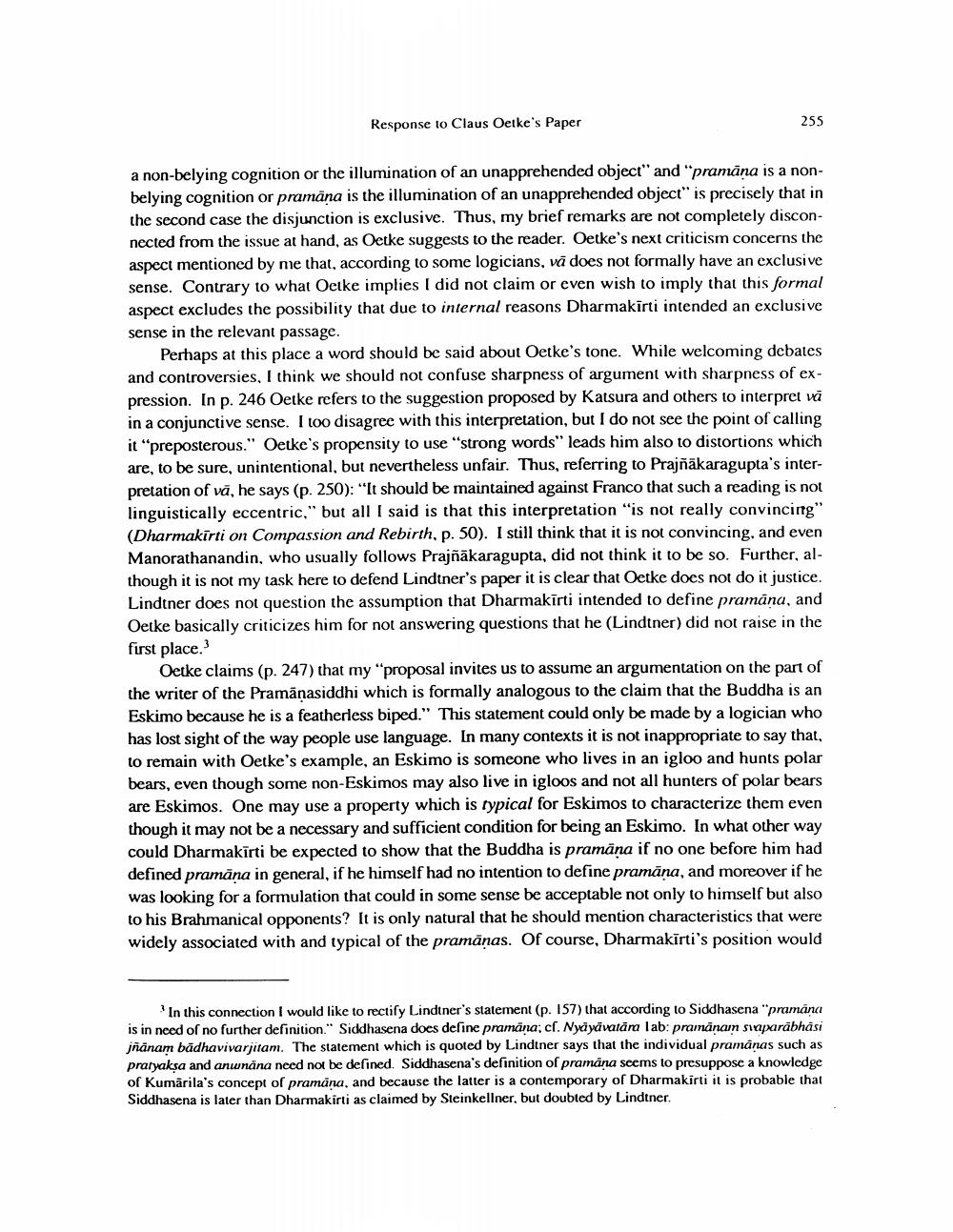________________
Response to Claus Oetke's Paper
255
a non-belying cognition or the illumination of an unapprehended object" and "pramāna is a nonbelying cognition or pramana is the illumination of an unapprehended object" is precisely that in the second case the disjunction is exclusive. Thus, my brief remarks are not completely disconnected from the issue at hand, as Oetke suggests to the reader. Oetke's next criticism concerns the aspect mentioned by me that, according to some logicians, vă does not formally have an exclusive sense. Contrary to what Oetke implies I did not claim or even wish to imply that this formal aspect excludes the possibility that due to internal reasons Dharmakirti intended an exclusive sense in the relevant passage.
Perhaps at this place a word should be said about Oetke's tone. While welcoming debates and controversies, I think we should not confuse sharpness of argument with sharpness of expression. In p. 246 Oetke refers to the suggestion proposed by Katsura and others to interpret vā in a conjunctive sense. I too disagree with this interpretation, but I do not see the point of calling it preposterous." Oetke's propensity to use "strong words" leads him also to distortions which are, to be sure, unintentional, but nevertheless unfair. Thus, referring to Prajñākaragupta's interpretation of vā, he says (p. 250): "It should be maintained against Franco that such a reading is not linguistically eccentric," but all I said is that this interpretation "is not really convincing (Dharmakirti on Compassion and Rebirth, p. 50). I still think that it is not convincing, and even Manorathanandin, who usually follows Prajñākaragupta, did not think it to be so. Further, although it is not my task here to defend Lindtner's paper it is clear that Oetke does not do it justice. Lindtner does not question the assumption that Dharmakirti intended to define pramāna, and Oetke basically criticizes him for not answering questions that he (Lindtner) did not raise in the first place.
Oetke claims (p. 247) that my "proposal invites us to assume an argumentation on the part of the writer of the Pramāṇasiddhi which is formally analogous to the claim that the Buddha is an Eskimo because he is a featherless biped." This statement could only be made by a logician who has lost sight of the way people use language. In many contexts it is not inappropriate to say that, to remain with Oetke's example, an Eskimo is someone who lives in an igloo and hunts polar bears, even though some non-Eskimos may also live in igloos and not all hunters of polar bears are Eskimos. One may use a property which is typical for Eskimos to characterize them even though it may not be a necessary and sufficient condition for being an Eskimo. In what other way could Dharmakīrti be expected to show that the Buddha is pramāna if no one before him had defined pramāna in general, if he himself had no intention to define pramana, and moreover if he was looking for a formulation that could in some sense be acceptable not only to himself but also to his Brahmanical opponents? It is only natural that he should mention characteristics that were widely associated with and typical of the pramānas. Of course, Dharmakirti's position would
In this connection I would like to rectify Lindtner's statement (p. 157) that according to Siddhasena "pramana is in need of no further definition." Siddhasena does define pramana; cf. Nyayavatāra lab: pramānam swaparābhasi jnanam bädhavivarjitam. The statement which is quoted by Lindtner says that the individual pramånas such as pratyakșa and anunāna need not be defined. Siddhasena's definition of pramana seems to presuppose a knowledge of Kumärila's concept of pramäna, and because the latter is a contemporary of Dharmakirti it is probable that Siddhasena is later than Dharmakirti as claimed by Steinkellner, but doubled by Lindtner.




